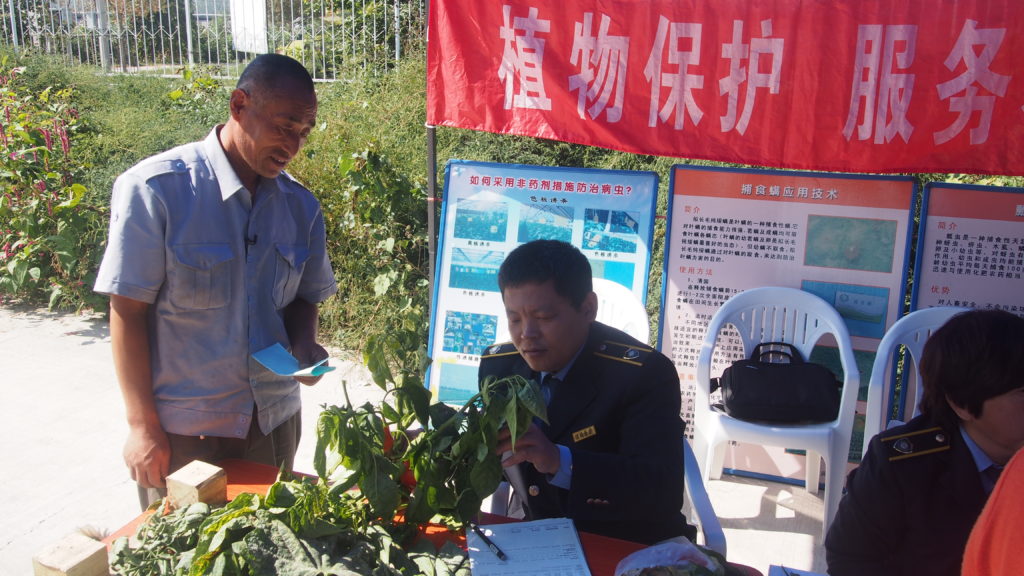
Overuse of pesticides for crop protection has been an increasingly common problem in farming, particularly in countries where they are affordable in comparison to other methods of pest control.
In many situations, growers apply pesticides preventively or according to a set schedule regardless of their current pest situation. This overuse is not only unnecessary, but can be very damaging to the local environment as pesticides often effect other living organisms or the soil and water nearby and not just the plant or crop targeted by the farmer.
Specifically China has recently released a number of agricultural policies aimed at reducing pesticide and fertilizer usage to reduce food scandals from pesticide contamination and they promote nonchemical pest control and a preference for least toxic/least residual pesticides.
As part of the Plantwise initiative in China, plant clinics have been established in three provinces for many years. In these plant clinics, the diagnosis and advice are provided to the grower in the form of a written prescription, much like the human health system with the aim of helping the grower manage their crops.
To assess the effects of these plants clinics in a new study, researchers from local plant protection stations, the Chinese Academy of Agricultural Sciences and CABI observed results from plant clinics spread out over Beijing’s farming areas over 5 years between 2012 and 2017. This was aimed at understanding the impact the agricultural advisory service – plant clinics – were having on farmers practices and the wider agricultural sector.
A total of 47,156 recommendations from plant doctors to 13,051 different growers were analysed for 250 different plant health problems on 91 crops, giving researchers a wide picture of the Plantwise programme and its effectiveness.
Promisingly, as a likely result of a combination of Plantwise interventions combined with China’s pesticide reduction policies, recommendations for biological control methods, as opposed to pesticide use, increased from 2% to staggering 42% between 2012 and 2017. This huge increase is extremely beneficial – for both farmers and the environment – as biological control is a much more sustainable and healthier way to grow crops, that will have less impacts on surrounding ecosystems.
Researchers also noticed there was an increase in pest monitoring by 8% – which in turn should lead to less use of pesticides for ‘preventative’ reasons.
Furthermore, recommendations of problematic plant protection agents (listed in the Montreal Protocol, Rotterdam or Stockholm conventions, or as highly toxic under WHO’s toxicity classification, which were already very rarely used in 2013 at 1.9%, were nearly completed phased out by 2017 at 0.2% usage.
When asked, around 92% of growers implemented advice given, suggesting Plantwise services are contributing to wider changes in agricultural practices on a larger scale. Consequently, researchers concluded by suggesting the further investment is needed and very warranted in such vital agricultural services to help further eradicate use of pesticides and move closer towards biological control as a preferred method of management.
The data showed Plantwise services are capable of encouraging policies, technologies and advising growers with pest management. Specifically, in countries where agriculture contributes largely to the gross domestic product, investment in large networks of frontline governmental agricultural services would be beneficial to further continue the positive results. Researchers Min Wan and Stefan Toepfer from the Chinese Ministry of Agriculture and Rural Affairs and CABI Joint Laboratory for Biosafety, who worked on the analysis, commented, “We believe that governmental agricultural extension services can help to change agricultural practices towards more sustainable farming and subsequently improve food safety. Rather than reducing or phasing out such services, more investment in these services would be highly warranted given the positive results from this study.”
For further details, or to see the full paper, Sustainable Pest Management through Improved Advice in Agricultural Extension
